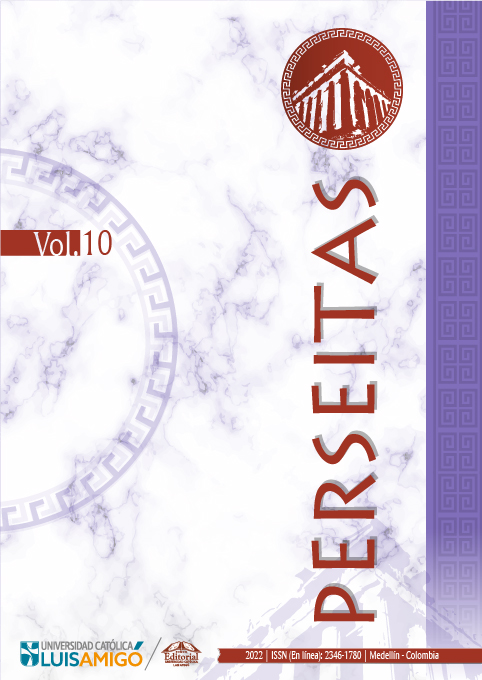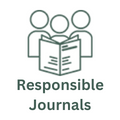Man is dead: Abraham Heschel's anthropology as a path to humanism and critique of modernity
DOI:
https://doi.org/10.21501/23461780.4467Keywords:
Deacralization, Ethics, Heschel, Humanism, Divine pathos, Human being, SymbolAbstract
In the thought of the Jewish philosopher and theologian Abraham Joshua Heschel (1907-1972), the human being is placed in a unique position before transcendence and nature; he is recognized as a real symbol of God and participant of divine life in a context of desacralization and dehumanization that was developing since the dawn of modernity. In dialogue with some contemporary thinkers, in this article we propose to retrace the conceptual and practical paths that led this rabbi to think and act energetically in favor of the reconstruction of human nature, and to point out the divine pathos as an element of solidarity, and rescue of human ethics and sacredness. Our proposal of reflection is structured in three fundamental points: the problem of the human religious symbology in relation to God; the divine pathos as a bridge towards God; and the human being who is Man and at the same time appeal to ethics.
Downloads
References
Ales Bello, A. (2018). O sentido do sagrado. Paulus.
Baccarini, E. (2002). O homem e o páthos de Deus. En Penzo, G. e Gibellini, R. (orgs), Deus na Filosofia do século XX, 3ª ed. (pp. 25-36). Edições Loyola.
Berger, P. (1985). O dossel sagrado: elementos para uma teoria sociológica da religião (J. C. Barcelos. Trad.). Paulinas.
Berger, P. (2000). A Dessecularização do Mundo: uma visão global. Religião e Sociedade, 21(1), 9-24. http://www.uel.br/laboratorios/religiosidade/pages/arquivos/dessecularizacaoLERR.pdf
Bergson, H. (1978). As duas fontes da moral e da religião (N. C. Caixeiro, Trad.). Zahar.
Bíblia de Jerusalém. (2004). Bíblia de Jerusalém, 3ª impressão. Paulus.
Buber, M. (2003). A lenda do Baal Schem. Perspectiva.
De Almeida, E. F. (jan./abr., 2019). Abraham J. Heschel e a mística do pathos divino. Horizonte. Revista de Estudos de Teologia e Ciências da Religão, 17(52), 132-147.
Descartes, R. (2000). Meditações Metafísicas. Martins Fontes. (Obra original publicada em 1641).
Dimas, S. (2007). A Auto-transcendência Cognitiva do Sujeito em Bernard Lonergan, Revista Portuguesa de Filosofia, 63(4), 845–876. http://www.jstor.org/stable/40338239
Foucault, M. (1994). Dits et écrits, vol.1. Gallimard.
Geertz, C. (1989). A Interpretação das Culturas. LTC.
Geertz, C. (2001). Nova luz sobre a antropologia. Zahar.
Goes Leone, A. (2000). A imagem divina e o pó da terra: humanismo sagrado e crítica da modernidade em A. J. Heschel [Dissertação Mestrado, Universidade de São Paulo]. USP Production Repository. https://repositorio.usp.br/single.php?_id=001102601&locale=pt_BR
Hall, S. (2006). A identidade cultural na pós-modernidade (T. T. da Silva, Trad.). DP&A.
Heschel, A. J. (1973a). Los Profetas: el hombre y su vocación. Paidós.
Heschel, A. J. (1973b). Los Profetas: simpatía y fenomenología. Paidós.
Heschel, A. J. (1974a). O Homem à procura de Deus. Paulinas.
Heschel, A. J. (1974b). O Homem não está só. Paulinas.
Heschel, A. J. (1975). Deus em busca do homem. Paulinas.
Heschel, A. J. (2010). Quem é o Homem? Triom.
Heschel, A. J. (jan, 1966). No Religion is an Island. Union Seminary Quarterly Review, XXI (2), part I, 117-134.
Kierkegaard, A. S. (2008). Ou bien... Ou bien... Gallimard.
Kimelman, R. (1985). Abraham Joshua Heschel: our generation’s teacher. Cross Current. http://www.crosscurrents.org/heschel.htm
Leone, A. G. (2002). A Imagem Divina e o Pó da Terra: humanismo sagrado e crítica da modernidade em A. J. Heschel. SP: Humanitas FFCH/USP.
Miotto, M. L. (junho, 1966). O homem está morto? Arts et Loisirs, (38), 8-9.
Moltmann, J. (2000). Trindade e Reino de Deus. Vozes.
Nogueira, E. S. (2017). O conceito de autodiscernimento, à luz dos profetas bíblicos, em confronto com a modernidade: uma visão religiosa em Abraham Joshua Heschel [Dissertação mestrado, Pontifícia Universidade Católica de Goiás]. TEDE. http://tede2.pucgoias.edu.br:8080/handle/tede/3682
Nogueira, E. S. (2020). A justiça social no profeta Amós à luz do método de autodiscernimento em Abraham Joshua Heschel [Dissertação Doutorado, Pontifícia Universidade Católica de Goiás]. TEDE. http://tede2.pucgoias.edu.br:8080/handle/tede/4515
Otto, R. (1995). O Sagrado: Um estudo do elemento não-racional na ideia do divino e sua relação com o racional (P. Velasques Filho, Trad.). Imprensa Metodista.
Paulo VI. (1965). Declaração Nostra Aetate sobre a igreja e as religiões não--cristãs. La Santa Sede–Vaticano. https://www.vatican.va/archive/hist_councils/ii_vatican_council/documents/vat-ii_decl_19651028_nostra-aetate_po.html
Platão. (2007). Teeteto e Crátilo (C. A. Nunes, Trad.). EDUFPA. (Obra publicada originalmente ca. 369 y 367 a.C.).
Rocher, G. (1971). Sociologia Geral 1 (A. Ravara, Trad.). Editorial Presença.
Wolff, H. W. (2008). Antropologia do Antigo Testamento. Hagnos.
Published
How to Cite
Issue
Section
License

This work is licensed under a Creative Commons Attribution-NonCommercial-NoDerivatives 4.0 International License.
La revista y los textos individuales que en esta se divulgan están protegidos por las leyes de copyright y por los términos y condiciones de la Licencia Creative Commons Atribución-No Comercial-Sin Derivar 4.0 Internacional.
















